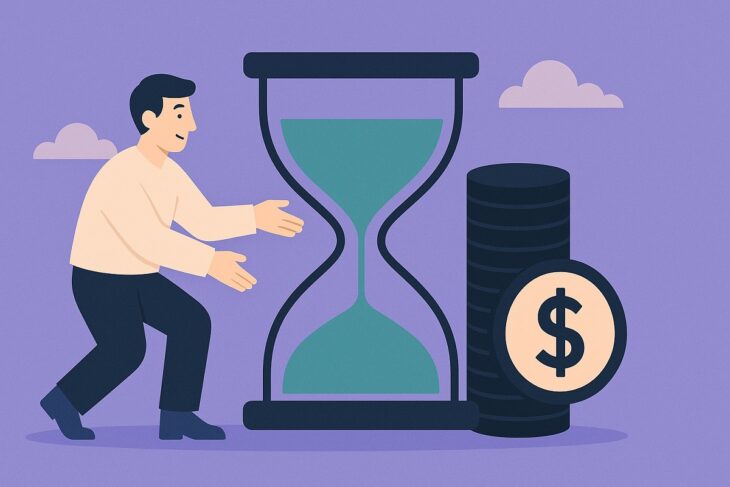If there is one principle that has quietly separated the financially free from the constantly busy, it is this: the wealthiest people focus on buying back their time instead of filling their lives with more things. This is not a motivational slogan; it is a measurable, life-altering strategy.
A 2021 Harvard Business School study found that individuals who spent money on time-saving services (like grocery delivery or professional help) reported significantly higher life satisfaction than those who spent similar amounts on material goods.
The “Buy Time, Not Things” mindset is not about rejecting possessions altogether; it is about understanding that the most finite and irreplaceable resource you have is your time.
The right financial moves can free up hours, lower stress, and allow you to focus on activities that actually generate happiness, health, and long-term wealth.
Material Spending vs. Time Spending Impact

| Factor | Buying Things | Buying Time |
| Immediate Happiness Boost | High, but short-lived | Moderate, but long-lasting |
| Long-Term Financial ROI | Low (most goods depreciate) | High (frees time to earn or improve skills) |
| Impact on Stress Levels | Neutral or negative (maintenance, debt) | Positive (less rush, more control) |
| Effect on Relationships | Minimal | Significant (more shared quality time) |
| Flexibility Over Time | Low (physical items can become a burden) | High (time can be allocated freely) |
How to Identify Where to Buy Time

Not every expense that frees time is worth the cost. The key is to calculate your effective hourly rate, how much your time is worth based on your income and work hours, and compare it to the cost of outsourcing a task.
For example, if your effective hourly rate is $50, paying someone $20 an hour to handle lawn care is a net gain.
High-Impact Areas to Buy Time:
- Household maintenance – Cleaning, yard work, repairs.
- Administrative tasks – Bookkeeping, appointment scheduling.
- Errands & shopping – Grocery delivery, online ordering.
- Commute reduction – Remote work setups, strategic housing.
The Emotional Shift – Why This Works Beyond Numbers
Money is a renewable resource; time is not. When you stop measuring wealth only by what you own and start measuring it by how much of your life you control, your decision-making changes dramatically.
People with a “buy time” mindset spend less energy on status purchases and more on creating systems that sustain freedom.
A Real-World Example – Travel Planning

Imagine you have one week off and could either spend two full days researching, booking, and juggling logistics for a vacation, or you could pay a travel concierge a modest fee to handle everything. Those two days you save could be spent with family, on creative work, or even relaxing before the trip.
Sometimes, the value is in avoiding the stress of last-minute decisions. For instance, when boarding a last-minute cruise, travelers who have outsourced the research and booking process can simply pack and go, while others lose precious days scrambling for deals, arranging transportation, and handling paperwork.
The difference is not just convenience; it is preserving energy and time that would otherwise be wasted.
How This Builds Long-Term Wealth
By consistently buying time, you create a self-reinforcing cycle:
1. Free time enables skill-building or income generation

Time is the foundation of every valuable pursuit. If you can free even five to ten hours a week by outsourcing low-value tasks, you can redirect that time toward activities that raise your market value – learning a new professional skill, starting a side business, or pursuing a certification that qualifies you for higher-paying roles.
Over time, this compounds into more earning potential and career security.
The difference between stagnating in your role and doubling your income within a decade often comes down to how much time you’ve been able to reinvest in yourself.
2. Higher income allows more outsourcing and time-buying
As your skills and income grow, the ability to delegate further increases. Instead of cleaning your own home, you might hire a professional service; instead of handling your taxes, you hire an accountant.
This creates a positive feedback loop – the more you earn, the more you can outsource, and the more you outsource, the more time you free to focus on high-return activities.
At a certain point, this loop can make time scarcity a non-issue in your daily life.
3. Increased control over time reduces burnout and health costs

Chronic stress is one of the most expensive and underestimated drains on wealth. When your days are overly packed with errands and responsibilities, recovery time disappears, and burnout creeps in.
By buying time, you create breathing room in your schedule, which allows you to rest, think clearly, and avoid costly health setbacks. Fewer sick days, fewer medical bills, and sustained energy levels all translate into better financial outcomes over decades.
4. Better health and energy allow you to keep generating value longer
The ultimate advantage of buying time is longevity – not just in life expectancy but in career relevance and productivity.
A well-rested, healthy person in their 50s or 60s can still command high fees, run successful ventures, or manage investments actively.
Compare this to someone who has burned out early and is forced to scale back work just when they could be maximizing their peak earning years. Protecting your health through time ownership extends your financial runway.
Practical “Buy Time” Examples and ROI
| Expense Type | Example | Time Saved per Month | Potential ROI Impact |
| Professional Help | Virtual assistant | 15–20 hours | More focus on high-value work |
| Time-Saving Service | Grocery delivery | 6–8 hours | More family or rest time |
| Strategic Housing | Moving closer to work | 10–30 hours | Reduced commuting stress, better productivity |
| Automated Systems | Bill pay automation | 2–3 hours | Prevents late fees, mental clarity |
Common Misconceptions
- “It’s a luxury.”
Not necessarily – sometimes buying time costs less than you think, especially when you account for opportunity costs. - “I should do everything myself to save money.”
This ignores the cost of your own time and the mental energy drain from tasks that don’t align with your goals. - “It’s only for high-income people.”
Even modest outsourcing – like laundry drop-off once a month – can have a noticeable impact on stress and productivity.
Final Thoughts
The “Buy Time, Not Things” rule is not about rejecting material comfort. It is about understanding that true wealth is measured in freedom, control, and how you spend your days.
Every purchase you make is an exchange – not just of money, but of time. If you choose to use money to expand your free time, you are effectively investing in the most precious, non-renewable asset you will ever own.
And unlike most possessions, this investment pays you back every single day.



